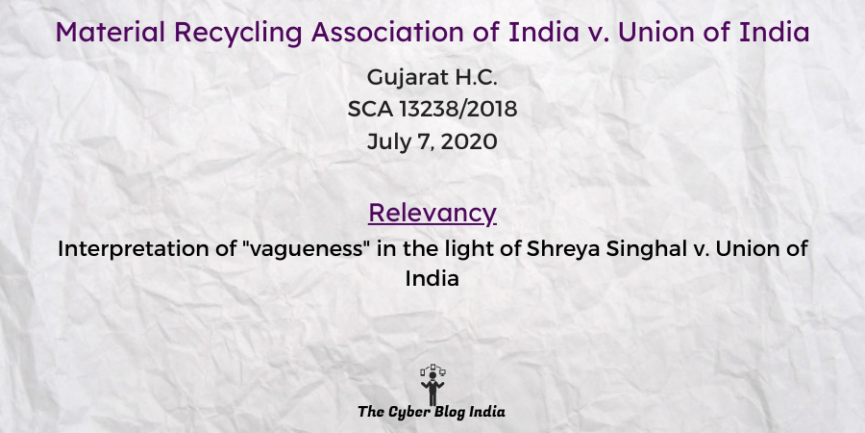Material Recycling Association of India v. Union of India

Material Recycling Association of India v. Union of India
2020 (7) TR 3155
In the High Court of Gujarat
SCA 13238/2018
Before Justice J.B. Pardiwala and Justice Bhargav D. Karia
Decided on July 7, 2020
Relevancy of the case: Interpretation of “vagueness” in the light of Shreya Singhal v. Union of India
Statutes and Provisions Involved
- The Information Technology Act, 2000 (Section 66A)
- The Indian Penal Code, 1860 (Section 120B, 499)
- The Integrated Goods Service Tax Act, 2017 (Section 13(8)(b))
- The Constitution of India, 1950 (Articles 14, 19, 265, 286, 226)
Relevant Facts of the Case
-
The petitioner actively engages in the recycling business and conducts scrap dealings with recycling companies outside India. Thus, they are located in non-taxable countries.
-
The petitioner actively exports goods under Section 16 of the IGST Act, 2017, and, as a result, no tax can be imposed on them.
Prominent Arguments by the Advocates
- The petitioner’s counsel argued that the members of the petitioner’s organisation are only receiving a commission of the sale receipt by the foreign clients, and thus this cannot be taxable. The counsel further added that both Section 13(8)(b) of the IGST Act, 2017 and Section 66A of the Information Technology Act, 2000 are “vague.” As a result, Section 66A was struck down, and the same should apply to Section 13(8)(b) as well. Therefore, Section 13(8)(b) must also be struck down.
- The respondent’s counsel argued that Section 13(8)(b) of the IGST Act, 2017 considers the location of the supplier as crucial. Since the supplier’s location is in India, they have the obligation to pay taxes.
Opinion of the Bench
- The court ruled that the person who acts as an intermediary cannot deem themselves an exporter of services since they function as a broker and facilitate the supply of goods.
- Considering the place of supply mentioned in Section 13(8)(b) of the IGST Act, 2017 is necessary.
- There is no distinction between intermediaries in or out of India. Simply because the receipts are outside India does not mean it is export of services.
- The court also complimented the legislature on including the location of the service supplier.
Final Decision
- The bench rejected the application and held Section 13(8)(b) of the IGST Act, 2017 as constitutional.
Marc Pereira, an undergraduate student at Rizvi Law College, Mumbai, prepared this case summary during his internship with The Cyber Blog India in January/February 2022.
